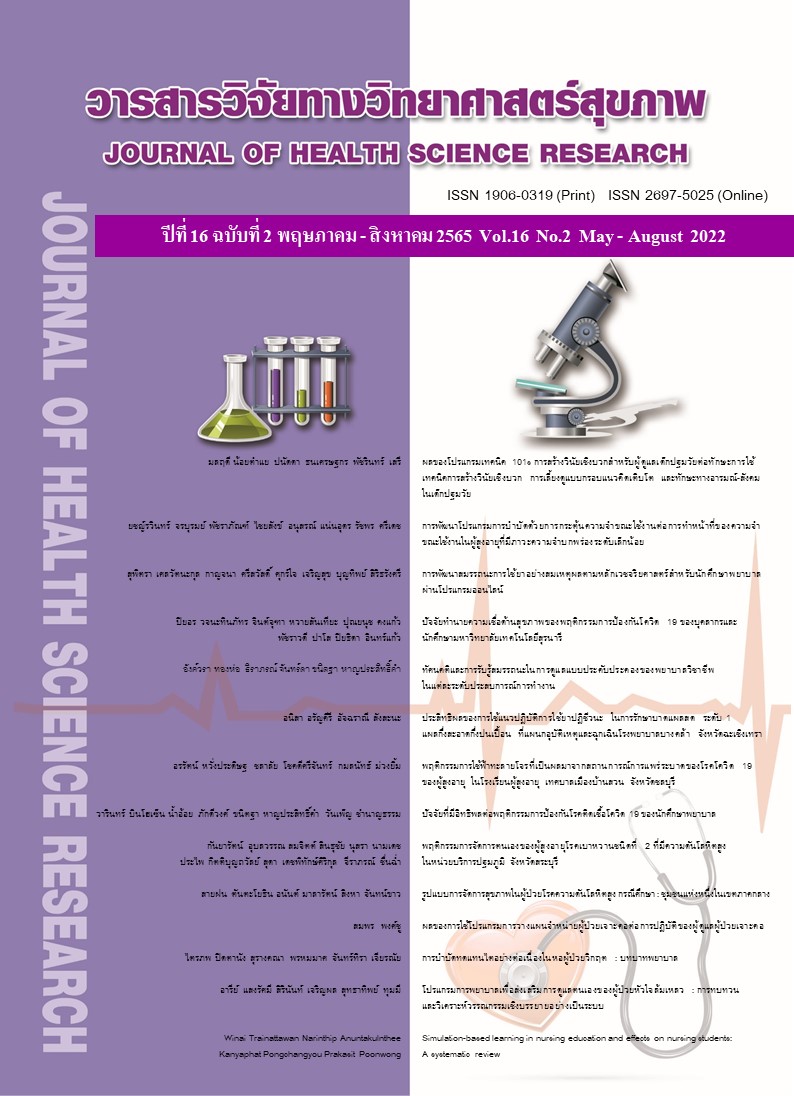ปัจจัยที่มีอิทธิพลต่อพฤติกรรมการป้องกันโรคติดเชื้อโควิด 19 ของนักศึกษาพยาบาล
Main Article Content
บทคัดย่อ
บทนำ : การส่งเสริมพฤติกรรมการป้องกันโรคติดเชื้อโควิด 19 ของบุคคลเป็นหลักสำคัญที่ช่วยควบคุมการแพร่ระบาดของโรคติดเชื้อโควิด 19
วัตถุประสงค์การวิจัย : เพื่อศึกษาพฤติกรรมและอำนาจการทำนายพฤติกรรมการป้องกันโรคติดเชื้อ
โควิด 19 ระดับเหมาะสมของปัจจัยส่วนบุคคล ปัจจัยรับรู้ความเชื่อด้านสุขภาพ และปัจจัยชักนำการปฏิบัติของนักศึกษาพยาบาล
วิธีการวิจัย : การวิจัยเชิงทำนาย ตัวอย่างคือนักศึกษาคณะพยาบาลศาสตร์ มหาวิทยาลัยเอกชนแห่งหนึ่ง จำนวน 460 ราย เครื่องมือที่ใช้เป็นแบบสอบถามปัจจัยรับรู้ความเชื่อด้านสุขภาพ ปัจจัยชักนำการปฏิบัติ และพฤติกรรมการป้องกันโรคติดเชื้อโควิด 19 วิเคราะห์ข้อมูลด้วยสถิติเชิงบรรยาย และสถิติถดถอย
โลจิสติกแบบไบนารี
ผลการวิจัย : พฤติกรรมการป้องกันโรคติดเชื้อโควิด 19 ส่วนใหญ่อยู่ในระดับเหมาะสม (59.78%) ปัจจัยที่มีอิทธิพลต่อพฤติกรรมการป้องกันโรคติดเชื้อโควิด 19 อยู่ในระดับเหมาะสม ประกอบด้วย ปัจจัยด้านการรับรู้ความเชื่อด้านสุขภาพ ได้แก่ การรับรู้ความสามารถในการปฏิบัติเหมาะสม (ORadj = 3.16, 95% CI= 1.99 -5.01) และปัจจัยชักนำการปฏิบัติ ได้แก่ การได้รับข้อมูลข่าวสารเหมาะสม (ORadj = 2.37, 95% CI= 1.49 -3.77) โดยร่วมกันทำนายพฤติกรรมการป้องกันโรคติดเชื้อโควิด 19 ระดับเหมาะสม (23.40%)
สรุปผล : การรับรู้ความสามารถในการปฏิบัติ และการได้รับข้อมูลข่าวสารอยู่ในระดับเหมาะสม สามารถทำนายพฤติกรรมการป้องกันโรคติดเชื้อโควิด 19 ของนักศึกษาพยาบาลได้ ดังนั้น การออกแบบโปรแกรมส่งเสริมพฤติกรรมการป้องกันโรคติดเชื้อโควิด 19 ควรให้ความสำคัญกับการส่งเสริมการรับรู้ความสามารถในการปฏิบัติ และการเผยแพร่ข้อมูลทางสื่อสังคมออนไลน์ให้ถึงในระดับที่เหมาะสม
Downloads
Article Details

อนุญาตภายใต้เงื่อนไข Creative Commons Attribution-NonCommercial-NoDerivatives 4.0 International License.
บทความที่ได้รับการตีพิมพ์เป็นลิขสิทธิ์ของวิทยาลัยพยาบาลบรมราชชนนี จังหวัดนนทบุรี
ข้อความที่ปรากฏในบทความแต่ละเรื่องในวารสารวิชาการเล่มนี้เป็นความคิดเห็นส่วนตัวของผู้เขียนแต่ละท่านไม่เกี่ยวข้องกับวิทยาลัยพยาบาลบรมราชชนนี จังหวัดนนทบุรี และคณาจารย์ท่านอื่น ในวิทยาลัยฯ แต่อย่างใด ความรับผิดชอบองค์ประกอบทั้งหมดของบทความแต่ละเรื่องเป็นของผู้เขียนแต่ละท่าน หากมีความผิดพลาดใด ๆ ผู้เขียนแต่ละท่านจะรับผิดชอบบทความของตนเองแต่ผู้เดียว
เอกสารอ้างอิง
World Health Organization. Coronavirus disease (COVID-19). [Internet]. 2022. [cited 2022 Jun 30]; Available from: https://www. who.int/healthtopics/coronavirus#tab=tab_1.
Ministry of Public Health. Public Health Practice Guidelines for Managing the COVID-19 Pandemic In the requirements issued under Article 9 of the Emergency Decree on Public Administration B.E. 2005 (No. 1) [Internet]. 2020 [cited 2020 Jul 31]; Available from: https://ddc.moph.go.th/viralpneumonia/file/ g_other/g_other02.pdf. (in Thai).
World Health Organization Thailand. Coronavirus Disease 2019 Situation Report No. 219. P 6. [Internet]. 2022 [cited 2021 Dec 29]; Available from: https://cdn.who.int/ media/docs/default-source/searo/thailand/2022_ 01_19_tha-sitrep-219-covid-19_th_r02.pdf? sfvrsn=390cc017_5. (in Thai).
Department of Disease Control, Ministry of Public Health. Guideline for surveillance prevention and control of COVID-19 among physician and public health personal. [Internet]. 2021. [cited 2021 Jul 31]; Available from https:// ddc.moph.go.th/uploads/publish/115092021061003 3910.pdf. (in Thai).
Stretcher V, Rosenstock IM. The Health Belief Model. In Glanz K, Lewis FM, Rimer BK, (Eds.). Health behavior and health education: theory, research and practice. San Francisco: Jossey-Bass; 1997.
Firouzbakht M, Omidvar S, Firouzbakht S, Asadi-Amoli A. COVID-19 preventive behaviors and influencing factors in the Iranian population; a web-based survey, BMC Public Health. 2021;21(1):143. doi: 10.1186/s 12889-021-10201-4.
Sribunrueng W, Ninwattana T, Sumransuk S, Anirapai K, Rugthangam S, Spiller P. Factors affecting prevention behavior of COVID-19 infection in Bangkok. Udon Thani Rajabhat University. Journal of Humanities and Social Science. 2021;10(1):195-206. (in Thai).
Waedueramae R, Kaewsuksai R, Kongkun P, Suwankanjana A, Chaiprasit K. Relationships between knowledge, perception and "new normal behaviors" on COVID-19 prevention among nursing students, faculty of nursing, Princess of Naradhiwas University. The Southern College Network. Journal of Nursing and Public Health. 2021;8(2):80-92. (in Thai).
Geounuppakul M, Panawatanakul S, Nuntananate P. The relationship among knowledge, health beliefs and COVID-19 prevention and control behavior of staff and nursing students, Faculty of Nursing Rajamangala University of Technology Thanyaburi. Nursing Journal of the Ministry of Public Health. 2021;31(2):81-92. (in Thai).
Morasakul B, Punthasee P. Knowledge and prevention behaviors regarding COVID-19 among the first-year nursing students of Saint Theresa International College and Saint Louis College. Regional Health Promotion Center 9 Journal. 2021;15(37):179-95. (in Thai).
Yeunyow T, Promwong W, Kadsanit K. Knowledge attitude and prevention behavior of Coronavirus disease 2019 (COVID-19) infection among nursing students in Boromarajonani College of Nursing, The North Eastern Region Network. Udonthani Hospital Medical Journal. 2021;29(2):204-13. (in Thai).
Kurnia AD, Masruroh NL, Melizza N, Rofi’I AYAB. Factors associated with preventive behaviors of COVID-19 among Indonesian nursing students: application of health belief model. Russ. Open Med. J. 2021;10(2):1-6 doi: 10.15275/rusomj.2021.0201.
Poonaklom P, Rungram V, Abthaisong P, Piralam B. Factors associated with preventive behaviors towards Coronavirus Disease (COVID-19) among adults in Kalasin province, Thailand, 2020. Outbreak Surveillance, Investigation, & Response Journal. 2020;13(3):78-89.
Choi JS, Kim JS. Factors influencing preventive behavior against Middle East Respiratory Syndrome-Coronavirus among nursing students in South Korea. Nurse Educ Today. 2016;40:168-72. doi: 10.1016/j.nedt. 2016.03.006.
Bloom BS. Mastery learning. In J. H. Block (Ed.), Mastery learning, theory and practice. New York: Holt, Rinehart, and Winston; 1971.
Bunthan W, Thipsut T, Turungruang S, Rungruang J, Choosrithong R, Kramulroj N. et al. Factors affecting the health promotion behaviors to Coronavirus Disease 2019 (COVID-19) infecting prevention of the first-year students in Huachiew Chalermprakiet
University. HCU Journal of Health Science. 2021;25(2):168-79. (in Thai).
Kim S, Kim S. Analysis of the Impact of health beliefs and resource factors on preventive behaviors against the COVID-19 pandemic.
Int. J Environ Res Public Health. 2020;17(22):8666. doi: 10.3390/ijerph17228666.
Sakdapat N. Psychosocial factors related to the COVID-19 prevention behaviors of undergraduate students. Journal of Behavioral Science. 2021;27(2):39-62. (in Thai).
Inthacharoen A, Kanchanapoom K, Tansakul K, Pattapat S. Factors influencing preventive behavior towards Coronavirus Disease 2019 among people in Khohong Town Municipality Songkhla Province. Journal of Council of Community Public Health. 2021;3(2):19-30. (in Thai).
Li S, Feng B, Liao W, Pan W. Internet use, risk awareness, and demographic characteristics associated with engagement in preventive behaviors and testing: cross-sectional survey on COVID-19 in the United States. J Med Internet Res. 2020;22(6):19782 doi: 10.2196/19782.


